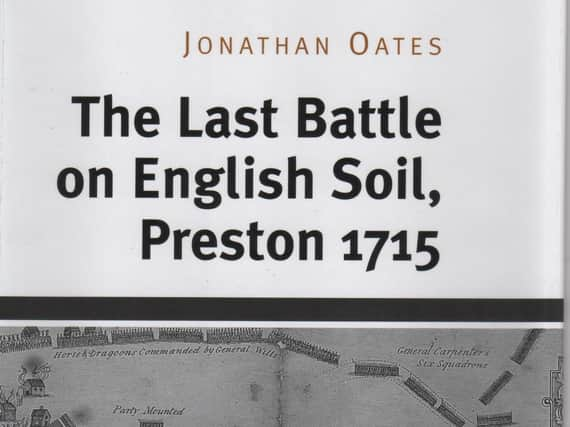Book review: The Last Battle on English Soil, Preston 1715 by Jonathan Oates


The second Jacobite rebellion of 1745, led by its Hollywood-style romantic hero Bonnie Prince Charlie, is the one which has captured the popular imagination of writers, artists and movie makers, leading many to think of 1715 as a kind of a relatively unimportant forerunner ... tame and dull compared with the events of Tartan-twirling dynamism of the ‘45.
But while Romanticism (think Sir Walter Scott, Rob Roy, etc.) may have won the day in terms of cultural resonance, the recent commemorations of the 1715 Battle of Preston and the various studies and events associated with it could be encouraging a rethink of the importance of the 1715 in this island’s history.
Advertisement
Hide AdAdvertisement
Hide AdOne important contribution to that re-evaluation is this valuable volume.
It is one of only a handful of serious studies to be published in many decades on the build-up (in Scotland and England) to the battle, the fighting, the personalities, the politics and the aftermath/impact of the battle.
It will add to the fresh look being taken at the importance of events of three centuries ago - when more men in Britain joined the Jacobite armies of 1715 than did in 1745 and when not only Scotland, but large parts of the north of England were ready to take up arms for the Stuart cause.
Oates argues that in 1715 the country, which had a new king from a foreign dynasty was politically divided.
Advertisement
Hide AdAdvertisement
Hide AdAnd with a drop in the number of government troops due to war in Europe, “this bid for the throne posed a greater danger than that of 1745 despite all the latter’s apparent initial success.”
Although the book definitely falls in the academic category, there is nothing dry or dusty about this well produced 250 page book, brought out to coincide with this year’s 300th anniversary of the Battle of Preston.
As well as being introduced to the key political ideas and parties of the time (Tory and Whig), and the religious divisions (especially within the Church of England), Oates paints a careful, nuanced picture of what remained a fragile (and only recently “united”) nation.
Oates is very careful to avoid any hint of partisanship, particularly in dealing with the way the rebels were dealt with.
Advertisement
Hide AdAdvertisement
Hide AdWhile the latter end of some Jacobites, particularly on the gallows of Lancashire might seem grizzly in the 21st century, the idea that the Hanoverian government tempered justice with mercy (albeit for its own reasons) is well explained.
Oats is also ultra-fair to the Jacobites whose lack of both preparedness and military leadership clearly played a part in their 1715 defeat.
Among the many helpful appendices are lists, including lists of the names, home towns, jobs, religious affiliations, military rank (if any) and fate of all the various North West rebels on a county-by-county basis.
The Last Battle on English Soil, Preston 1715, is certain to become a “must read” for any serious student of the period, whether the interest stems from academic enquiry or a love of local history.
(Ashgate, hardback, £70)